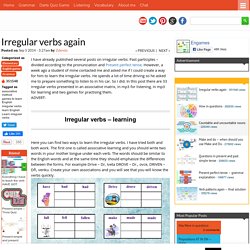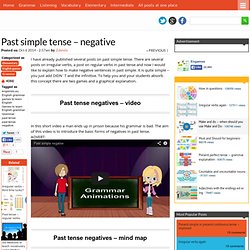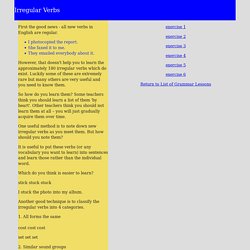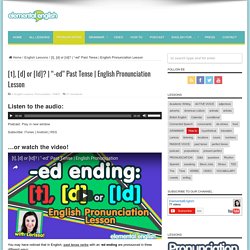

Past simple exercises - regular verbs. Verbs: To be past simple - exercises esl. Irregular Verbs in English. To Be Past - Grammar for Kids. Irregular verbs again. I have already published several posts on irregular verbs: Past participles – divided according to the pronunciation and Present perfect tense.

However, a week ago a student of mine contacted me and asked me if I could create a way for him to learn the irregular verbs. He spends a lot of time driving so he asked me to prepare something to listen to in his car. So I did. In this post there are 33 irregular verbs presented in an associative matrix, in mp3 for listening, in mp3 for learning and two games for practising them. Simple Past - Grammar for Kids. (Past Simple of Regular Verbs) (Past Simple of Irregular Verbs) (Regular/Irregular Verbs) (Interactive Book by Mrs Haquet) (Present and Past Tenses) (a Ramadan story) Bradley´s Matching Pairs-

Past Tense Irregular Verbs English Grammar Game. Past simple tense – negative. I have already published several posts on past simple tense.

There are several posts on irregular verbs, a post on regular verbs in past tense and now I would like to explain how to make negative sentences in past simple. It is quite simple – you just add DIDN´T and the infinitive. To help you and your students absorb this concept there are two games and a graphical explanation. Past Tense - Irregular Verbs. Starship - English - Blast the Rocket. Past Simple ESL Grammar Game - Jeopardy Betting Game. Irregular Past Simple, Spelling Activity Online for ESL. Kids ESL Games - Past Simple Tense Grammar Games for ESL Young Learners. Past Simple Tense Game, Regular/Irregular Verbs- Snakes and Ladders Game. ESL Interactive Fun Games Here we have the games carefully laid out for you.

Follow the links to browse the variety of games offered. This is only the directory for interactive games and exercises. Our ESL fun games here include : Snakes and Ladders, Hangman, Spelling games, Wheel of Fortune, TV Games(Betting Game), Mazes, Memory Games, Matching exercises, Sequencing exercises, Picture Quizzes, Catch it and more. These games provide the ultimate fun in practising the following skills: Past Tense Irregular Verbs English Grammar Game. Past Tenses Grammar Games for ESL. ESL Classroom Jeopardy Quiz Show Irregular Verbs Past Simple. ESL Interactive Fun Games Here we have the games carefully laid out for you.

Follow the links to browse the variety of games offered. This is only the directory for interactive games and exercises. Our ESL fun games here include : Snakes and Ladders, Hangman, Spelling games, Wheel of Fortune, TV Games(Betting Game), Mazes, Memory Games, Matching exercises, Sequencing exercises, Picture Quizzes, Catch it and more. These games provide the ultimate fun in practising the following skills: Irregular Verbs. English Irregular Verbs. Irregular Verbs. First the good news - all new verbs in English are regular.

I photocopied the report. She faxed it to me. They emailed everybody about it. However, that doesn't help you to learn the approximately 180 irregular verbs which do exist. Luckily some of these are extremely rare but many others are very useful and you need to know them. So how do you learn them? One useful method is to note down new irregular verbs as you meet them. It is useful to put these verbs (or any vocabulary you want to learn) into sentences and learn those rather than the individual word. Which do you think is easier to learn?
Stick stuck stuck I stuck the photo into my album. Another good technique is to classify the irregular verbs into 4 categories. 1. Set set set 2. Beat beat beaten eat ate eaten blow blew blown throw threw thrown drink drank drunk sing sang sung speak spoke spoken wake woke woken 3. Bend bent bent sleep slept slept spend spent spent bring brought brought buy bought bought teach taught taught. "-ed" Past Tense Pronunciation. Listen to the audio: Podcast: Play in new window Subscribe: iTunes | Android | …or watch the video!

You may have noticed that in English, past tense verbs with an -ed ending are pronounced in three different ways: [t][d] or [Id]. For example, if I say the past tense verb “walked“, as in, “I walked away,” what is the last sound that you hear in the verb? “Walked” [wakt] 1) The -ed verb ending sounds like a [t], “Walked” [wakt], even though it ends in the letter “d”. What do you hear when I say: “smelled“, as in, “it smelled bad.” 2) The -ed verb ending sounds like a [d]: “smelled” [smeld] And when I say, “visited”, as in “I visited New York City”, how did I pronounce that “-ed” ending? [Id] [vizitid].